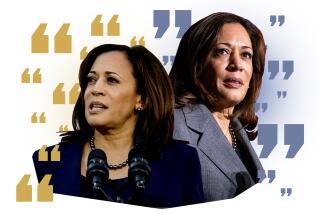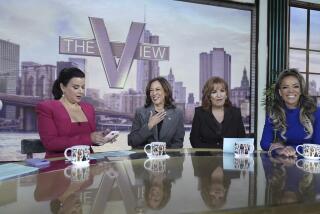So far, campaign needs work
Re “Tactics change in high-stakes N.H. debates,” Jan. 6
Both the Democratic and the Republican candidates offered their fixes to the healthcare crisis during the debates. Universal and single-payer health insurance were among the solutions put forward. None of the candidates, however, mentioned what I believe is the main cause of the crisis: a labor shortage in the healthcare industry. There are not enough doctors and nurses to meet the demand for their services. No matter who pays for healthcare -- individuals, employers or the government -- it will remain prohibitively expensive and hard to come by for many as long as demand is high and supply is low. This is fundamental economics.
The fix, then, is to increase the supply of providers by building new medical schools. Few medical schools have been built in the United States in the last few decades. A significant number of them could be built in a relatively short period of time for a fraction of the cost of the Iraq war. None of the candidates in the debates included building additional medical schools in their plans to solve the country’s healthcare crises.
Gene Pomerantz
Tarzana
I can’t help but wonder what citizens of foreign countries think when they hear our Republican candidates proclaim on several occasions that this is the greatest country on Earth. This coming seconds after denying the Bush administration’s arrogance in foreign policy and Mike Huckabee’s sermon on all people being born equal.
Ted Einstein
Venice
I’ve been following the presidential race and finally get it: Change is the new religion! Religion is good, unless you’re a Mormon, then it’s bad. Not as bad as no religion -- atheists are the worst. Evangelicals are good -- or bad -- because there are so many of them and they all vote the same. Same is good if you’re a Republican, bad if you’re a Democrat. Black is the new female, female is the new old. Old is always bad. Some things never change.
Susan Treadwell
Los Angeles
Now that “change” has become the common mantra in the presidential races, can a common voter hope for an answer to the questions: Change
Hershl Hartman
Los Angeles
Why have the media spent so much time on the early primaries? Are a few people in several small states to limit our selection of a new president? Are we Californians or are we sheep? We have more votes than many small states combined -- are we to be prevented from voting our choice? Let’s wait until Feb. 5 and not be intimidated by these early indicators.
James Keefer
San Francisco
Re “A new dawn in New Hampshire,” Jan. 5
While Hillary Rodham Clinton’s claim that much of Barack Obama’s record is unknown may be true, her statement that she is “more than happy to take my record and my qualifications, which you all have been extensively going after for many years now, to the voters of New Hampshire” highlights a widespread and bipartisan undercurrent of political hypocrisy in Washington, which many Iowa caucus voters, Democrats and Republicans alike, appeared to turn away from.
By blocking public access to presidential papers and records, including those from her own eight years in the White House as first lady -- a soapbox on which she plants an oversized flag of her own political experience -- what she (and Bill Clinton) really seem “happy” to take to voters in New Hampshire and elsewhere is her own version or spin of her qualifications. Such ingrained hypocrisy is fueling voters’ hunger for real change this year.
Ged Kenslea
North Hollywood
More to Read
Get the L.A. Times Politics newsletter
Deeply reported insights into legislation, politics and policy from Sacramento, Washington and beyond. In your inbox three times per week.
You may occasionally receive promotional content from the Los Angeles Times.










